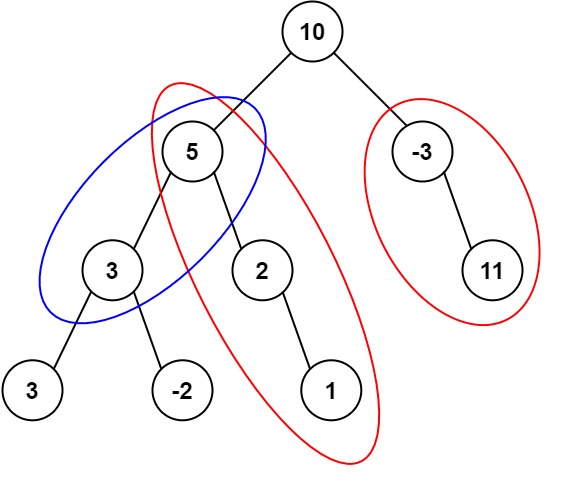Given the root of a binary tree and an integer targetSum, return the number of paths where the sum of the values along the path equals targetSum.
The path does not need to start or end at the root or a leaf, but it must go downwards (i.e., traveling only from parent nodes to child nodes).
Test Cases
Example 1:

Input: root = [10,5,-3,3,2,null,11,3,-2,null,1], targetSum = 8
Output: 3
Explanation: The paths that sum to 8 are shown.
Example 2:
Input: root = [5,4,8,11,null,13,4,7,2,null,null,5,1], targetSum = 22
Output: 3
Constraints:
-
The number of nodes in the tree is in the range
[0, 1000]. -
-10<sup>9</sup> <= Node.val <= 10<sup>9</sup> -
-1000 <= targetSum <= 1000
Solution
/**
* Definition for a binary tree node.
* public class TreeNode {
* int val;
* TreeNode left;
* TreeNode right;
* TreeNode() {}
* TreeNode(int val) { this.val = val; }
* TreeNode(int val, TreeNode left, TreeNode right) {
* this.val = val;
* this.left = left;
* this.right = right;
* }
* }
*/
class Solution {
public int pathSum(TreeNode root, int targetSum) {
Map<Long, Integer> prefix = new HashMap<>();
prefix.put(0L, 1);
return dfs(root, targetSum, 0, prefix);
}
private int dfs(TreeNode root, int target, long current, Map<Long, Integer> prefix) {
if (root == null) {
return 0;
}
current += root.val;
int count = prefix.getOrDefault(current - target, 0);
prefix.put(current, prefix.getOrDefault(current, 0) + 1);
count += dfs(root.left, target, current, prefix);
count += dfs(root.right, target, current, prefix);
prefix.put(current, prefix.getOrDefault(current, 0) - 1);
return count;
}
}# Definition for a binary tree node.
# class TreeNode:
# def __init__(self, val=0, left=None, right=None):
# self.val = val
# self.left = left
# self.right = right
class Solution:
def pathSum(self, root: Optional[TreeNode], targetSum: int) -> int:
def dfs(root, prefix, current):
if not root:
return 0
current += root.val
count = prefix.get(current - targetSum, 0)
prefix[current] = prefix.get(current, 0) + 1
count += dfs(root.left, prefix, current)
count += dfs(root.right, prefix, current)
prefix[current] -= 1
return count
prefix = {0: 1}
return dfs(root, prefix, 0)